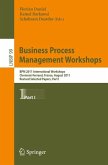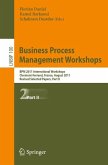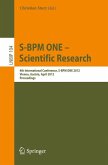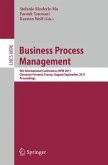In today's dynamic business world, the success of a company increasingly depends on its ability to react to changes in its environment in a quick and flexible way. Companies have therefore identified process agility as a competitive advantage to address business trends like increasing product and service variability or faster time to market, and to ensure business IT alignment. Along this trend, a new generation of information systems has emerged-so-called process-aware information systems (PAIS), like workflow management systems, case handling tools, and service orchestration engines.
With this book, Reichert and Weber address these flexibility needs and provide an overview of PAIS with a strong focus on methods and technologies fostering flexibility for all phases of the process lifecycle (i.e., modeling, configuration, execution and evolution). Their presentation is divided into six parts. Part I starts with an introduction of fundamental PAIS concepts and establishes the context of process flexibility in the light of practical scenarios. Part II focuses on flexibility support for pre-specified processes, the currently predominant paradigm in the field of business process management (BPM). Part III details flexibility support for loosely specified processes, which only partially specify the process model at build-time, while decisions regarding the exact specification of certain model parts are deferred to the run-time. Part IV deals with user- and data-driven processes, which aim at a tight integration of processes and data, and hence enable an increased flexibility compared to traditional PAIS. Part V introduces existing technologies and systems for the realization of a flexible PAIS. Finally, Part VI summarizes the main ideas of this book and gives an outlook on advanced flexibility issues.
The book's target groups include researchers, PhD students and Master students in the field of information systems. After readingthe book, they will better understand PAIS flexibility aspects. To support the easy use as a textbook, a series of exercises is provided at the end of each chapter and slides and further teaching material are available on the book's web site www.flexible-processes.com. Professionals specializing in business process management (BPM) who want to obtain a good understanding of flexibility challenges in BPM and state-of-the-art solutions will also benefit from the presentations of open source as well as commercial process management systems and related practical scenarios.
With this book, Reichert and Weber address these flexibility needs and provide an overview of PAIS with a strong focus on methods and technologies fostering flexibility for all phases of the process lifecycle (i.e., modeling, configuration, execution and evolution). Their presentation is divided into six parts. Part I starts with an introduction of fundamental PAIS concepts and establishes the context of process flexibility in the light of practical scenarios. Part II focuses on flexibility support for pre-specified processes, the currently predominant paradigm in the field of business process management (BPM). Part III details flexibility support for loosely specified processes, which only partially specify the process model at build-time, while decisions regarding the exact specification of certain model parts are deferred to the run-time. Part IV deals with user- and data-driven processes, which aim at a tight integration of processes and data, and hence enable an increased flexibility compared to traditional PAIS. Part V introduces existing technologies and systems for the realization of a flexible PAIS. Finally, Part VI summarizes the main ideas of this book and gives an outlook on advanced flexibility issues.
The book's target groups include researchers, PhD students and Master students in the field of information systems. After readingthe book, they will better understand PAIS flexibility aspects. To support the easy use as a textbook, a series of exercises is provided at the end of each chapter and slides and further teaching material are available on the book's web site www.flexible-processes.com. Professionals specializing in business process management (BPM) who want to obtain a good understanding of flexibility challenges in BPM and state-of-the-art solutions will also benefit from the presentations of open source as well as commercial process management systems and related practical scenarios.
"The book is written by two renowned BPM experts and a must-read for anyone interested in flexible process support within information systems. It shows that BPM is not just about making diagrams. The real challenge is to realize information systems that support processes without jeopardizing flexibility. The authors present a wide range of powerful techniques to support this." Wil van der Aalst, Eindhoven University of Technology, The Netherlands
"Comprehensive coverage of flexibility in PAIS, clear explanation of concepts and their practical applications, and easily understandable examples - this book is an excellent choice for students, computer scientists, and practitioners." Stefanie Rinderle-Ma, University of Vienna, Austria
"If there would be any doubt left, this book annihilates the picture of workflow systems as being rigid, unyielding types of information systems. The authors draw from their deep knowledge of the field to explain the state-of-the-art with respect to flexibility mechanisms: A rich and highly readable treatise." Hajo Reijers, Eindhoven University of Technology, The Netherlands
"The book provides an excellent description of recent advancements in the area of business process flexibility. It is well-organized, comprehensive, and comprehensible. A highly recommended text book, both for BPM researchers and advanced courses." Pnina Soffer, University of Haifa, Israel
"Comprehensive coverage of flexibility in PAIS, clear explanation of concepts and their practical applications, and easily understandable examples - this book is an excellent choice for students, computer scientists, and practitioners." Stefanie Rinderle-Ma, University of Vienna, Austria
"If there would be any doubt left, this book annihilates the picture of workflow systems as being rigid, unyielding types of information systems. The authors draw from their deep knowledge of the field to explain the state-of-the-art with respect to flexibility mechanisms: A rich and highly readable treatise." Hajo Reijers, Eindhoven University of Technology, The Netherlands
"The book provides an excellent description of recent advancements in the area of business process flexibility. It is well-organized, comprehensive, and comprehensible. A highly recommended text book, both for BPM researchers and advanced courses." Pnina Soffer, University of Haifa, Israel









